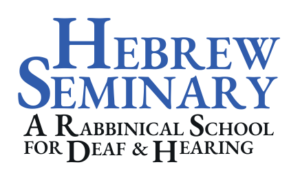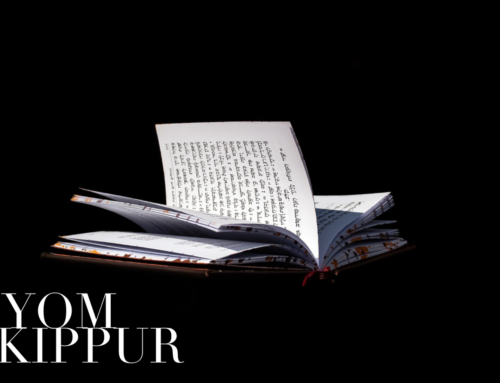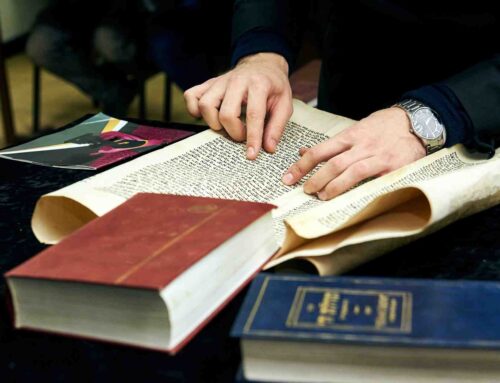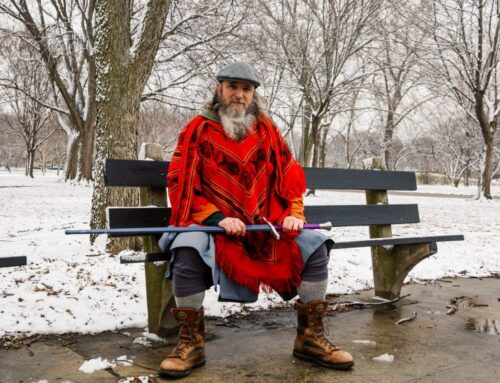Hebrew Seminary President Rabbi Dr. Douglas Goldhamer teaches that each of us has the opportunity to create a Prayer Vision in preparation for the High Holidays. “We need to visualize, think, and write down all the wonderful things that we want to happen to us in the New Year … and this is what I’m going to do for God in return.” Below we share examples of this prayer vision process, as well as insights into HaShem’s 13 Attributes of Mercy, which we recite during the month of Elul and the High Holidays.
A Prayer Vision
By Student Rabbi Tirtzah Israel
The upcoming High Holy days, beginning with Rosh Hashanah through Simchat Torah, grants us the opportunity to reflect upon the blessings and challenges of the past year, while bestowing opportunities to revel in the prospect of renewal. We let go of the old stuff in order to improve and to re-connect to our natural-selves.
As a candidate for rabbinic ordination from the Hebrew Seminary, I envision for the upcoming year that I will be responsible for the following: (1) conduct Adult Education classes in the basics of Kabbalah and Jewish Mysticism; (2) serve as an assistant rabbi at a Congregation providing life-cycle services and one-on-one Pastoral Counseling, and; (3) to further develop my private practice in the healing arts using the Kabbalah and Healing Meditations as taught by my mentor and teacher Rabbi, Dr. Douglas Goldhamer.
In return, what I will do for God is be more patient with myself, less judgmental and critical. I will develop deep self-compassion so that I will have compassion to give to others in my healing practice. I believe, as my teacher reminded me, “you can’t give what you don’t have.” I will focus my meditative energies towards understanding the divine attributes so that I can use those energies to activate connectivity and healing.
A Prayer Vision
By Student Rabbi Alison C. Brown
It feels as though some pretty wonderful things are already happening in my life this year. My twin girls started college and so far, so good! Now I have more time to focus on trying not to call or text them; to finishing my rabbinic thesis; and to worrying about the November elections!
Good health is of course my number one wish for my family and all those I share this planet with. Good health is intricately connected to the health of our planet and I also wish for this, the good health of planet earth. I count on God, on Makom, God’s manifestation in the physical world, for Her continuous creation. Likewise, God counts on us, her human partners to protect creation. In return for the gift of good health, I will work harder to live sustainably and support sustainable causes. With prayers and blessings I will thank God for all that Her creation provides for me and I will try every day to minimize my environmental footprint. I love and appreciate our farmlands and the farmers that tend them lovingly; I love and appreciate our Lake Michigan and the volunteers that protect it lovingly. In return for these gifts this year, I will better consider my consumer choices. (I’d give you examples, but I’m so spoiled it’s embarrassing!)
I also wish that in our upcoming November elections my fellow Americans will embrace our long- held values of equality, justice, safety and equal opportunity for all. I wish that every eligible American registers to vote. I wish that every registered voter votes. I wish that those candidates who will fight for equality, justice, safety and equal opportunity for all will get elected. The High Holidays continue throughout October; our elections are November 8th. The timing is, I believe, besheirt (meant to be). While we give thought to our personal vision for the New Year, we can soul search our vision for this great country and ask ourselves, “Can we take pride in the ongoing candidates’ political discourse and the values they represent?” And, “What can I do to support the values I hold dear within the context of a democratic society?” The Shechina embraces us all. I too should try my best to embrace and be empathetic towards each and every person; so too should our elected officials. In return for God’s support of my prayer vision, I will volunteer at voter registration drives and increase my volunteer commitments in general. Additionally I will continue to practice and improve my Hebrew skills, as well as make time to practice the many Kabbalistic meditations that Rabbi Dr. Douglas Goldhamer has taught me, in hopes that my prayers will be more efficacious and my deeds less self-centered.
God’s 13 Attributes of Mercy
by Student Rabbi Sandra Charak
It is also suggested that we recite and meditate twice a day on Adonai’s 13 attributes of God during the month of Elul until Yom Kippur. According to Kabbalah, Adonai is closest to us during this month, in spirit, energetically speaking. The gematria of Elul אלול equals 13 which is also love אהב. There are 13 attributes of Adonai, showing love to His children if they listen. This is best illustrated on Yom Kippur when we get a chance to create a new contract with Adonai promising teshuvah, our turning, returning to God. Any changes we promise to strive for, even minor ones as long as we are moving towards becoming better people, causes Adonai to smile.
Adonai’s Thirteen Attributes of Mercy, or His ethical attributes are repeated twice in the Torah, in Exodus and the prophet Micah, giving them extra important meaning. These verses are the very core of the Selichot prayers said each day during Elul until Yom Kippur. S’licha means forgiveness. During the month of Elul we do teshuvah knowing that we are all one and connected in God.
The Thirteen Attributes begins with Adonai, Adonai :
- יהוה
Adonai – compassion before a person sins;
- יהוה
Adonai – compassion after a person has sinned; - אל
El – mighty in compassion to give all creatures according to their need, - רחום
Rachum – merciful, that humankind may not be distressed; - חנון
Chanun – gracious if humankind is already in distress; - אפים ארך
Erech appayim – slow to anger;
- רב חסד
Rav chesed –plenteous in mercy; - אמת
Emet – truth; - לאלפים נצר חסד
Notzer chesed laalafim – keeping mercy unto the thousands; - נשא עון
Noseh avon – forgiving iniquity; - פשע נשא
Noseh peshah – forgiving transgression;
- חטאה נשא
Noseh chatah – forgiving sin; - ונקה
Venakeh – and pardoning.





Leave A Comment
You must be logged in to post a comment.